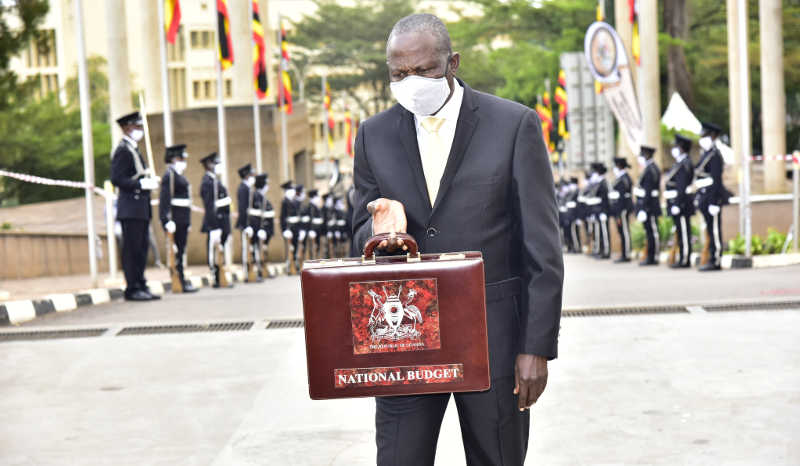News
2020/21 Budget Key Takeaways

Minister Matia Kasaija before he presented the COVID-19 Budget

The Minister of Finance Matia Kasaija today presented an incomplete budget for the coming 2020/2021 financial year during a rain soaked Parliamentary session. The downpour briefly interrupted the budget presentation that was held in a tent outside Parliament building in step with the social distancing requirements for both the MPs and invited guests.
However, contrary to tradition where the Finance Minister presents allocations for each ministry and spells out tax measures in detail, Kasaija today said the impact of the COVID-19 pandemic had dramatically impacted the proposed budget allocations that had been passed by Parliament.
Kasaija said: “The recent emergencies, especially the Corona Virus pandemic have necessitated additional interventions and resource allocations after the Budget was approved. Consequently, the budgets of all Ministries, Agencies and Local Governments will be revised to align them with the nine (9) strategic priorities and 14 production lines to focus the budget on production and not consumption. I will accordingly return to Parliament for the necessary approval.”
However, the minister made only broad projections of expenditure and revenue, with a promise to table revised expenditures or sector allocations.

The Budget was read in an improvised tent
And as speaker Kadaga informed Parliament, President Museveni rejected Parliament’s decision on the introduction of new taxes. This means that the budget that will eventually will be radically different from the rough sketch that has been presented today.
Import Substitution
Minister Kasaija and indeed President Museveni emphasised that the coming budget will put emphasis on promoting import substitution as a policy response to the global supply disruptions brought about by the ongoing COVID-19 pandemic.
Some of the key aspects of import substitution agenda is to enable increased access to manufacturers of goods that were previously being imported.
Minister Kasaija said government would capitalise Uganda Development Bank (UDB) with a whopping UGX1.45 trillion to enable the government-owned lender offer more medium and long-term loans to the private sector at more favourable interest rates.
Museveni said: “This disease (COVID-19) has woken us up a bit. For all those that want to set up factories for import substitution, the address is UDB,” said Museveni in a post-budget address that was relayed live from State House.
Some of the factories Museveni said the government will fast track is the leather tanning and processing industry to provide raw materials for makers of shoes that will fill the gap created by reduced imports of footwear.
Besides giving cheaper credit to entrepreneurs, Minister Kasaija announced an increase of import duty of up to 60% for agricultural products and 35% for non agricultural products.
Some of the goods previously imported that the government wants to encourage is industrial sugar that is used in beverage companies like makers of sodas as well as in the pharmaceutical sector.
Kasaija said: “We have been importing refined industrial sugar yet we are a surplus producer of sugar. We have agreed with sugar manufacturers to produce refined industrial sugar locally and we shall protect them from imports.”
The minister also announced VAT exemptions for agricultural equipment as well as VAT on processed milk in order to make Uganda’s milk and other agricultural products more competitive.
Although Minister Kasaija has proposed offering VAT exemptions for importers of diagnostic tools for the prevention and management of COVID-19 and other epidemics, President Museveni warned that this might jeopardise the market of entrepreneurs who are involved in the production of the same.
Indeed, some local manufacturers had started to produce these diagnostic tools not only for human but also for the animal and poultry sector.
Empowering Youth through SACCOs
Minister Kasaija said he had allocated some UGX250bn for lending to youth groups under Savings and Cooperative Organisations. But President Museveni said he prefers to increase this to accommodate as many youth as possible because they are a sizeable proportion of the population who need capital.
Performance
Minister Kasaija says that Uganda’s economy managed to expand by 3.1%, less than the anticipated 6% due to the Coronavirus outbreak. This year’s economic performance was lower than last year’s 5.4%.
The services and manufacturing sectors recorded the worst performance dropping 3.6% and 2% respectively from highs of above 6% the previous year.
Although Kasaija earlier pointed out that reduction in demand for agricultural goods had adversely affected farmers, the sector overall recorded positive growth of up to 4.2%.
Increases in coffee and fish exports helped to prop up Uganda’s economy despite the slump in the services and manufacturing sectors.
Comments


















